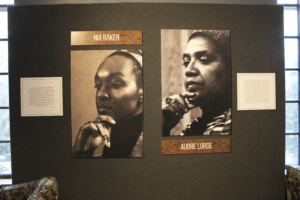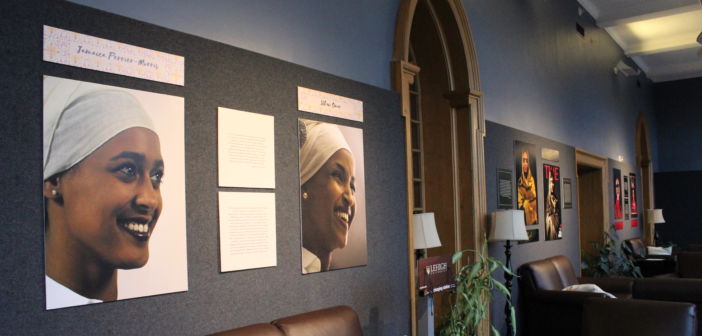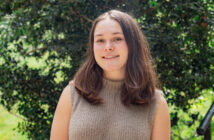Imitation is the sincerest form of flattery.
However, in the case of Ashley Omoma, ’18, imitation goes a step further. In her “Herstory Makers” exhibit, Omoma juxtaposes portraits of empowered, successful women from across the globe with photos of Lehigh women in the local community.
The exhibit was held in the Girdler Gallery on March 1 at noon.
Omoma’s project provides an outlet for women to recognize themselves through the successes of others by showcasing women at Lehigh modeling famous portraits of accomplished women.
Among some of the featured women are female education activist Malala Yousafzai, writer Audre Lorde and politician Ilhan Omar.
To Omoma, the most important part of the project revolved around representation and the impact of seeing diverse faces in a plethora of professional spaces.
“Representation has always been super important to me, and I wanted to do something that encompassed recognizing yourself in another woman and recognizing yourself in other people,” Omoma said. “I started thinking more about that, and that’s how the idea for this project came to be.”
Omoma said projects like this serve an especially important role considering the demographics of a school like Lehigh. The celebration of diversity, she said, helps women envision a future for themselves that they otherwise may never strive for.
She said students of color might feel isolated in certain fields, which might be difficult for some individuals — especially in a primarily white college.
“This project was supposed to take all of those ideas and put them together,” Omoma said. “It’s about recognizing yourself in another person who looks like you, then seeing those people who were successful in the places that you want to be, and finally seeing that you can get there too.”
The power of seeing these similar faces in professional and empowered spaces has real-life applications, as Omoma knows from experience.
Prior to Lehigh, Omoma said she never considered a career in photography, simply because of a lack of diverse representation within the profession.
“I was told that I couldn’t, there was just no space for someone like me in that field,” Omoma said. “…Because I didn’t have that representation I never thought I could do that, so I wanted to break away from that misconception. I wanted to provide that representation for other students.”
The exhibit boasts mirrored images of students alongside professionally taken portraits of the figurehead women. Everything from lighting, camera angle and wardrobe are precisely matched, all in an effort to show how similar these women are, in both a physical and nonphysical sense.
Omoma said mirroring someone with a similar background and identity encourages women to pursue their passions and believe that one day their work will pay off.
“It’s like mirroring a possible future you may have,” Omoma said. “It’s not just the physical that’s replicated, it’s also the hard work that they put in, it’s their characteristics, and everything that makes them who they are.”
Many of the photo pairings were matched in accordance to the students’ background. Students who pursue specific passions could align with empowered women in society that foster those same goals.
Nia Baker, ’19, was modeled after Audre Lorde, an influential Black feminist, lesbian writer. Baker said that mirroring Lorde helped connect her with something outside of herself.

Nia Baker, ’19, mirrors Audre Lorde as part of the Herstory project, which is on display in Girdler Gallery in the UC. Ashley Omomoa, ’18, hopes to empower women through her project. (Julia Adelizzi/B&W Staff)
“As a participant, the impact it had on me was significant because it is really powerful to understand yourself as a continuation of a broader history of resistance,” Baker said. “Seeing it as something so much bigger than yourself is really cool, and for people looking at it I think it’s interesting to see that this activist mindset is still being pursued and can be seen in the people we interact with every day.”
Omoma’s project aims to bridge the women of past with those of the present and make the seemingly distant accomplishments of other females appear close and attainable for those within the Lehigh community.
Sara Machiniak, the associate director of the Center for Gender Equity, said projects like Omoma’s carry a lasting impact on women at Lehigh and can help open doors that previously seemed sealed.
“The exhibit is truly about empowerment, it’s truly about having agency and having a positive narrative the whole way around,” Machiniak said. “This is an opportunity for Lehigh women to see themselves reflected in a different way, to see themselves as fully empowered women, as individuals who have agency over their own experience and agency over their own futures, and hopefully have the confidence to go out into the world, kick a whole bunch of butts and take a whole bunch of names.”






Comment policy
Comments posted to The Brown and White website are reviewed by a moderator before being approved. Incendiary speech or harassing language, including comments targeted at individuals, may be deemed unacceptable and not published. Spam and other soliciting will also be declined.
The Brown and White also reserves the right to not publish entirely anonymous comments.
1 Comment
“… Lehigh women … hopefully have the confidence to go out into the world, kick a whole bunch of butts and take a whole bunch of names.” Somehow I keep thinking that goal sounds like a negative to me. I see several groups kicking each others butts and taking each others names, each group being self satisfied in their efforts. I want Lehigh women to have the confidence to go out into the world to make it a better place while reducing bruised butts and egos.
Kudos to Ashley on her creativity and talent.